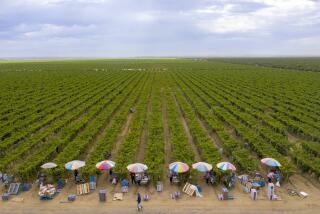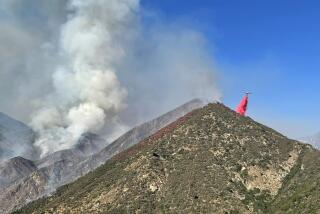A Degree of Success for Growers
- Share via
Ventura County growers scrambled early Wednesday to beat back a bone-chilling freeze, firing up orchard heaters, wind machines and even helicopters in all-night battles to protect their crops.
Minor damage was reported in some of the coldest pockets of the county. But most growers escaped serious problems as predictions of the lowest temperatures in years--as low as 23 degrees in the citrus-rich Ojai Valley--never came to pass.
Frost protection efforts, which have forced growers to operate on little sleep since the start of the week, were aided by winds that prevented temperatures from plummeting as expected.
Agricultural officials were hoping that light winds would prevail through this morning to again stave off the threat to crops.
“We dodged a bullet, no question about it,” said Earl McPhail, the county’s agricultural commissioner. “Everybody I know came through this real well.”
That isn’t to say it was easy.
Santa Paula citrus and avocado rancher Bob Pinkerton had spent Tuesday afternoon running sprinklers in his groves, a frost-protection measure that can raise the temperature by as much as 4 degrees.
Later, after only a few hours of sleep, he was up at 10 p.m., responding to an alarm that warned that the temperature had dropped to 34 degrees in his orchard. He fired up his 15 wind machines to circulate warmer air hovering closer to the ground.
“When that alarm rings, you go,” Pinkerton said. “There’s no pulling the covers back over your head.”
Pinkerton was working all night. As the wind machines buzzed overhead, sounding like a squadron of helicopters, the veteran rancher monitored thermometers staked throughout his orchard.
The temperature would have had to drop to 28 degrees or below for at least a couple of hours to cause significant crop damage, Pinkerton said.
By 5 a.m., temperatures were still below freezing as Pinkerton bumped along the rutted dirt roads that slice through his ranch. But it only dropped to 28 degrees once during the night, and then for less than half an hour.
By sunrise Wednesday, he was prepared to declare victory, at least for the night.
“I think we won,” he said. “On a night like this, when you expect the worst, you throw everything you’ve got at it. There’s not much else you can do.”
Like many growers, Pinkerton carries crop insurance to guard against significant damage. And if the cold wreaks widespread havoc, there is always the possibility that the government will offer assistance. That is what happened the last time a winter freeze damaged Ventura County’s crops.
In the wake of a 1998 cold snap that caused $74.3 million damage to the citrus and avocado industries, the county was declared a federal disaster area, opening the door for farmers who sustained heavy losses to apply for low-interest loans.
Nothing close to that has happened this winter.
In some areas, growers reported minor frost burn on leaves and damage to new growth. And they were trying Wednesday morning to make sure it didn’t get any worse.
At the Santa Paula-based Limoneira Co., the county’s largest farming enterprise, Chris Taylor, senior vice president of farming, said workers fired up orchard heaters for the first time in years to stave off the chill.
And farm manager Don Reeder, who oversees production of 3,000 acres of avocados and citrus in the county, brought in helicopters to accomplish the same mission.
“Depending on where you were standing, it wasn’t as cold as it could have been,” said Reeder, adding that the temperature in Moorpark dropped to 27 degrees for a short time. “All in all, it could have been a lot worse.”
For a while, Ojai avocado and tangerine grower Jim Churchill thought it would be worse. After learning that the forecast called for 23-degree temperatures, he spent much of Tuesday picking as many avocados as possible before the cold could get them.
In half an hour Tuesday night, the temperature at his ranch plunged from 37 degrees to 33. Then the wind picked up, raising temperatures to the high 30s until about 3 a.m. The temperature dropped again, to 26 degrees for a short time in one area, but the threat had diminished by then.
“If the wind hadn’t come down, we would have been toast,” he said. “We were incredibly lucky.”


